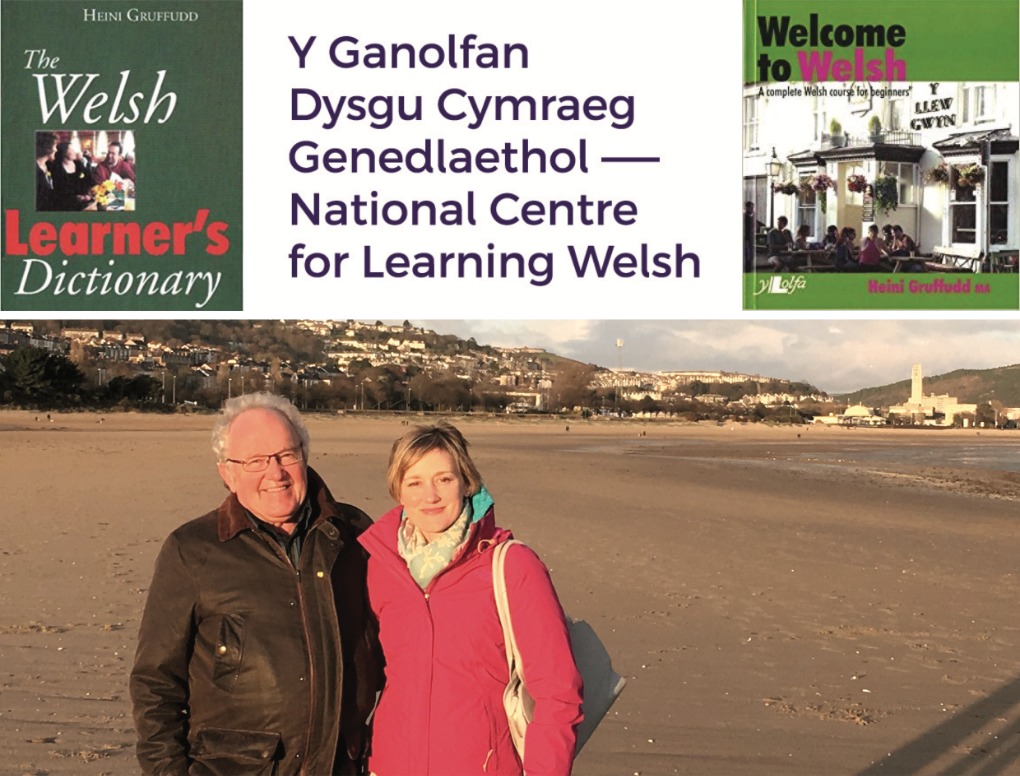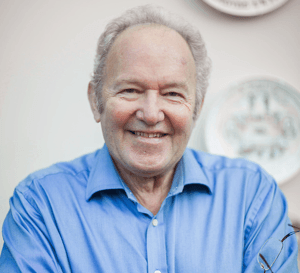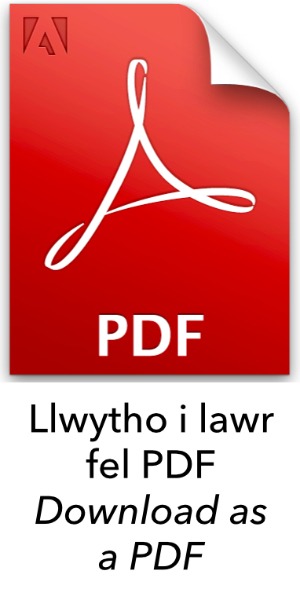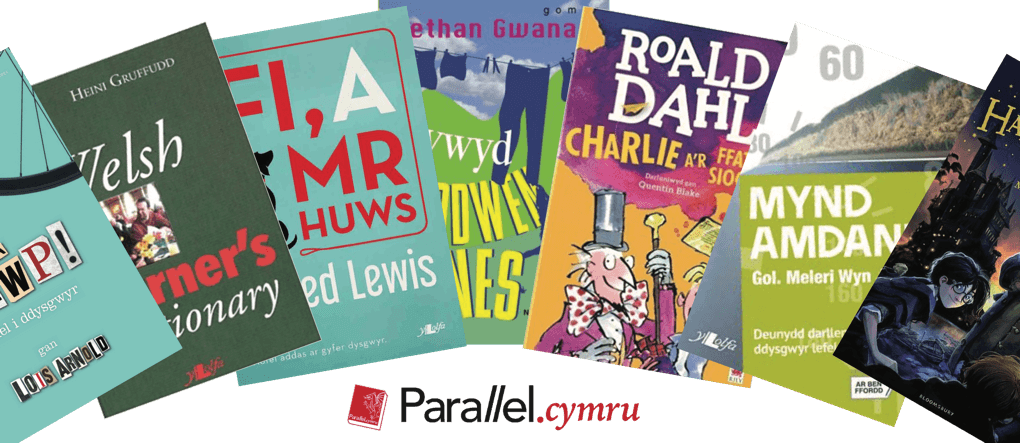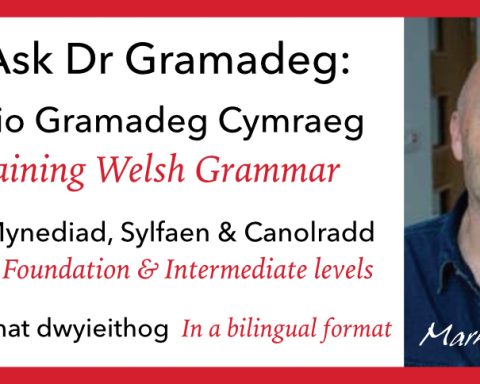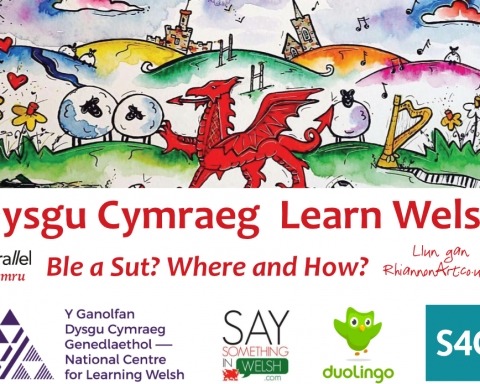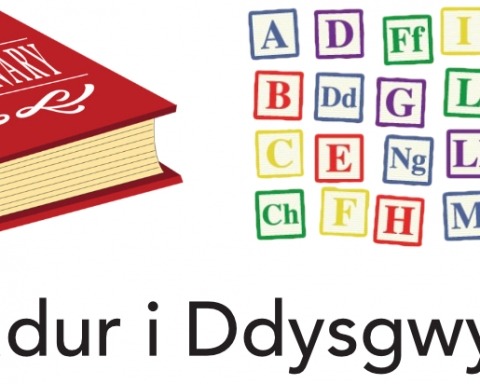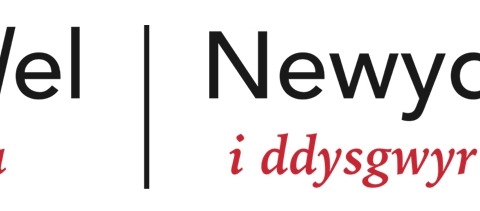Mae’r teulu Gruffudd wedi cael effaith arwyddocaol ar y byd sy’n siarad Cymraeg. Roedd mam Heini, Kate Bosse-Griffiths, wedi ffoi o’r Almaen i osgoi erledigaeth y Natsiaid. Ymgartrefodd yng Nghymru a daeth yn guradur Amgueddfa Abertawe, sefydlodd Y Ganolfan Eifftaidd ym Mhrifysgol Abertawe, a chyhoeddodd sawl llyfr yn y Gymraeg. Roedd tad Heini yn ddarlithydd clasuron yn Rhychychen ac wedyn ym Mhrifysgol Abertawe, a sefydlodd brawd Heini, Robat, wasg Y Lolfa. Roedd ei ferch Efa yn Brif Weithredwr yr Urdd, ac mae hi’n Brif Weithredwr y Ganolfan Dysgu Cymraeg Genedlaethol erbyn hyn. Mae Heini ei hunan wedi ysgrifennu llawer o lyfrau sy’n addysgu Cymraeg i Oedolion, ymgyrchu am hawliau iaith, arloesi ym maes ymchwil yn yr iaith ac wedi cyfrannu at sefydlu a rhedeg Tŷ Tawe, y Ganolfan Gymraeg gyntaf i gael ei sefydlu yng Nghymru. Yma, mae Heini ac Efa wedi cytuno i’m cais i holi ei gilydd am addysgu Cymraeg…
The Gruffudd family have had a significant impact on the Welsh-speaking world. Heini’s mother, Kate Bosse-Griffiths, fled Nazi persecution in Germany, settled in Wales, became curator at Swansea Museum, established Swansea University’s Egypt Centre, and learnt and published several books in Welsh. Heini’s father was a classics lecturer at Oxford and then Swansea University, and Heini’s brother Robat founded the publisher Y Lolfa. His daughter Efa was the Chief Executive of Urdd, and is now the Chief Executive of the National Centre for Learning Welsh. Heini himself has written many books that teach Welsh for Adults, campaigned for language rights, has pioneered research in the language and contributed to founding and running Tŷ Tawe, the oldest Welsh language Centre. Here, Heini and Efa kindly granted my request to ask each other about teaching Welsh…
|
|
|
Efa yn holi Heini:
| Pryd ddechreuest ti sgwennu llyfrau dysgu Cymraeg? Ro’n i wedi dechre dysgu Cymraeg mewn ysgol gyfun Saesneg, ac ro’n i hefyd wedi dechre dysgu mewn Wlpan i oedolion yn Abertawe. I helpu gyda’r dysgu ro’n i’n gwneud cartwnau stori, i gael dysgwyr i gymryd rhan y cymeriadau. Daeth y syniad wedyn ei bod yn bosibl gwneud llyfr cartwnau i ddysgu Gymraeg. Doedd dim byd tebyg yng Nghymru ar y pryd, er bod nifer o lyfrau dysgu Cymraeg, fel cyfres Teach Yourself Welsh. Ro’n i’n lwcus bod y cartwnydd Elwyn Ioan yn gweithio yn Y Lolfa, ac fe wnaeth e gartwnau gwell na fi, ac fe ddaeth Welsh is Fun! a Welsh is Funtastic! yn llwyddiannus iawn. Cawson nhw eu cyfieithu i’r Wyddeleg ac i’r Gernyweg. | Why did you start writing books that teach Welsh? I started teaching Welsh in an English-medium secondary school, and I also started teaching Wlpan courses for adults in Swansea. To help with the teaching I started doing cartoon stories, to get learners to take the part of the characters. The idea then came that it would be possible to make a cartoon book to teach Welsh. Nothing similar was available in Welsh at the time, although there were a number of books for teaching Welsh, such as the Teach Yourself Welsh series. I was fortunate that the cartoonist Elwyn Ioan was working for Y Lolfa, and he did the cartoons better than I did, and Welsh is Fun! and Welsh is Funtastic! became very successful. They were translated into Irish and Cornish. |
| Daeth cyfle gwahanol wedyn. Ro’n i’n hoffi tynnu lluniau gyda’r camera, ac ro’n i’n datblygu ac argraffu lluniau du a gwyn. Dechreuodd cylchgrawn i oedolion, Siop Siarad, a gofynnon nhw i fi wneud gwersi misol. Tynnes i luniau o’r teulu a ffrindiau i greu storiau, a defnyddio’r storiau ar gyfer gwersi, a chyflwyno gramadeg newydd ym mhob gwers. Casgles y cyfan wedyn at ei gilydd a gwneud llyfr arall, Welcome to Welsh. Mae hwnna wedi gwerthu’n dda ers 1984. | A different opportunity then came. I enjoyed taking photos with a camera, and I was developing and printing black and white photos. A magazine for learners started, Siop Siarad, and they asked me to do monthly lessons. I took photos of my family and friends to make stories, and I used the stories for lessons, and present new grammar in every lesson. I collected the lessons together to make another book, Welcome to Welsh. That has sold well since 1984. |
| Gwnes i nifer o lyfrau eraill wedyn. Roedd angen geiriadur i ddysgwyr, yn dangos sut mae’r iaith yn cael ei defnyddio, ac o’r syniad yna daeth The Welsh Learner’s Dictionary. Fe ges i gomisiwn wedyn i wneud llyfr gramadeg i ddisgyblion. Ces i’r syniad o gyflwyno camau ar gyfer elfennau gramadeg, fel bod y llyfr yn cynnwys 20 cam i’r berfau, a rhywbeth tebyg i arddodiaid, cymalau, rhagenwau ac ati. Dyna sut daeth Cymraeg Da. Ond roedd rhaid i hwn fod yn llyfr Cymraeg, ac roedd yr esboniadau’n aml yn fwy cymhleth na’r gwersi. Gwnes i fersiwn Saesneg wedyn i’r Lolfa, sef Welsh Rules. | I then did several other books. There was a need for a dictionary for learners, to show how the language is used, and so the idea of The Welsh Learner's Dictionary came. I then had a commission to do a grammar book for pupils. I had the idea of presenting steps of grammar elements, so that the book contains 20 steps of verbs, and something similar of prepositions, clauses, pronouns and so on. That was how Cymraeg Da came to be. But this had to be a Welsh book, and the explanations were often more complicated than the rules themselves. I then did an English version for Y Lolfa, that is Welsh Rules. |
| Beth sydd wedi newid ers hynny? Mae’r maes dysgu Cymraeg i Oedolion wedi dod yn llawer mwy proffesiynol. Ers blynyddoedd mae’r Llywodraeth wedi rhoi arian i ganolfannau dysgu Cymraeg i ddatblygu dosbarthiadau a chyrsiau. Mae llawer o bobl erbyn hyn yn ennill bywoliaeth trwy ddysgu Cymraeg. Mae’n bwysig bod y gweinyddu ddim yn mynd yn bwysicach na’r dysgu. Mae cyrsiau’n awr yn cael eu paratoi gan ganolfannau Cymraeg i Oedolion - mae’r tiwtoriaid yn gallu dilyn y cyrsiau, a does dim cymaint o bwysau arnyn nhw i baratoi eu stwff eu hunain. Er bod y byd yn fwy proffesiynol, mae’n bwysig cadw’r ysbryd a’r egni sydd gan bobl sy’n gwirfoddoli. | What has changed since then? The Welsh for Adults field has become more professional. For years the Government has given money to Welsh teaching centres to develop classes and courses. Since then many people are earning a living through teaching Welsh. It is important that administration does not become more important than the teaching. Courses are now prepared by Welsh for Adults centres- the tutors follow the courses, and there isn’t so much pressure on them to prepare things themselves. Although it has become more professional, it is important to keep the spirit and energy by people who are volunteering. |
| Mae hi hefyd yn bosibl edrych nol a gweld bod yr Wlpanau cynnar wedi bod yn effeithiol iawn. Roedd rhaid i’r dysgwyr ddod 5 noson yr wythnos. Roedd hyn yn golygu eu bod nhw o ddifri. Ymysg y dysgwyr yn Abertawe yn y cyfnod hwnnw roedd Nigel Jenkins y bardd, Delyth Evans y gantores, a llawer o bobl eraill sy wedi cyfrannu i fywyd Abertawe a Chymru. Un o’r rhain yw Jeff Roberts. Adeiladwr oedd e. Helpodd e lawer gyda’r gwaith adeiladu yn Nhŷ Tawe. Newidiodd e iaith ei deulu i’r Gymraeg. Dyna’r peth pwysica. | It is also possible to look back and see that the early Wlpan courses were very effective- learners had to come five nights a week. This meant that they were serious. Amongst the learners in Swansea at the time were Nigel Jenkins the poet, Delyth Evans the singer, and lots of other people who have contributed to life in Swansea and Wales. One of these is Jeff Roberts, who was a builder. He helped a lot with building work in Tŷ Tawe. He changed his family’s language to Welsh- that's the most important thing. |
| Beth yw’r ffordd orau o ddysgu Cymraeg? Y ffordd orau o ddysgu yw’r ffordd naturiol- ffeindio cariad Cymraeg. Byw mewn ardal Gymraeg. Os y’ch chi’n gwneud hyn, does dim angen mynd i wersi. Rwy’n nabod nifer sy wedi dysgu yn y ffordd naturiol- dy’n nhw ddim yn swnio fel dysgwyr! | What is the best way to learn Welsh? The best way to learn is a natural way- finding a Welsh sweetheart. Live in a Welsh language area. If you can do this, there isn't a need to go to lessons. I know a number of people who have learnt in a natural way- they don't sound like learners! |
| Ond mae’n rhaid i’r rhan fwyaf o bobl sy’n dysgu wneud hynny trwy wersi, llyfrau, teledu, y we ac ati. Y peth pwysicaf yw penderfyniad. Mae’n rhaid ichi wybod pam ry’ch chi’n dysgu. Mae perthyn i wlad, perthyn i gymuned yn bwysig i lawer iawn. Ond mae eisiau dod yn berson cyflawn yn bwysig iawn hefyd. Trwy’r iaith, mae’r drws yn agor i holl ddiwylliant Cymru, ei gorffennol a’i dyfodol. | But most people need to learn through lessons, books, TV, the web and so on. The most important thing is the determination. You have to know why you are learning. Being part of the country, part of the community, is what’s important to many people. But wanting to become a complete person is important as well. Through the language, the door opens to the whole Welsh culture, its past and its future. |
| Wrth ddysgu, y nod yw llwyddo gyda chamau bach. Defnyddio rhyw gymaint o Gymraeg bob dydd, a bob wythnos defnyddio tipyn bach mwy. Un peth sy’n help yw gwneud yn siwr bod siaradwyr Cymraeg diog yn siarad Cymraeg gyda chi bob amser. Weithiau mae’n anodd dod o hyd i siaradwyr Cymraeg. Os felly, gwnewch ymdrech i fynd i ddigwyddiadau Cymraeg, mynd i sesiynau siarad mewn canolfannau Cymraeg. Os oes dim grwp i ddysgwyr yn eich ardal chi, dechreuwch un, ac fe gewch chi ffrindiau am oes. | In learning, the goal is to succeed with small steps. Use plenty of Welsh each day, and each week use a little bit more. One thing that is a help is to ensure that lazy Welsh speakers always speak Welsh with you. Sometimes it is hard to find Welsh speakers. If so, make an effort to go to Welsh language events, go to speaking sessions in Welsh language centres. If you don't have a group of learners in your area, start one, and you will have friends for life. |
| Beth yw’r hufen ia gorau yn y byd? Diolch am gwestiwn syml... Joe's wrth gwrs! | What is the best ice cream in the world? Thanks for a simple question... Joe's of course! |
Trwy’r iaith, mae’r drws yn agor i holl ddiwylliant Cymru, ei gorffennol a’i dyfodol.
Heini yn holi Efa:
| Pam nad est ti i fod yn athrawes? Ron i eisiau bod yn wahanol a doeddwn i ddim eisiau mynd i’r ysgol/mynd i’r coleg/mynd nol i ysgol. Pe byddwn ugain mlynedd yn iau, efallai byddwn wedi cael blwyddyn ‘gap’ ac wedi teimlo’n wahanol am fynd i weithio mewn ysgol ar ôl gadael y coleg. Fe wnes i gais sawl gwaith i wneud cwrs dysgu, ond fe lwyddais i ffeindio swyddi eraill cyn dechrau ar y cwrs! Rwy’n gallu gwerthfawrogi erbyn heddiw bod boddhad mawr i’w gael o fod yn athro neu athrawes neu’n diwtor Cymraeg i Oedolion, ond rwy’n hapus iawn yn gwneud beth rwy’n ei wneud nawr! | Why didn’t you become a teacher? I wanted to be a teacher and I didn't want to go to school/go to college/go back to school. If I was 20 years younger, perhaps I would have have had a gap year and then feel differently about going to work in a school after leaving college. I applied several times to do a teaching course, but I succeeded in finding other jobs before starting the course! I can appreciate today that there is great satisfaction from being a teacher or tutor for Welsh for Adults, but I am very happy doing what I am doing today! |
| Pa fudiad / sefydliad sy wedi rhoi’r pleser mwya i ti wrth weithio iddyn nhw? Rwyf wedi mwynhau pob swydd. Rwyf wedi gweld biwrocratiaeth ar ei orau a’i waethaf. Rwyf wedi gweithio yn y sector gyhoeddus i Fwrdd yr Iaith Gymraeg ac i Gyngor Celfyddydau Cymru, ond mae’n rhaid i mi gyfaddef mai gweithio yn y trydydd sector, i Urdd Gobaith Cymru roddodd y pleser mwyaf i fi. Roedd yn wych gallu bod yn rhan o fudiad egnïol yn llawn o bobl ymroddgar yn credu yn eu gwaith. Roedd cyfle i ddenu arian i wneud gweithgareddau gwych gyda phlant a phobl ifanc, ac roedd modd gweld ôl ein gwaith. | What movement/organisation has given you the most pleasure to work for? I have enjoyed each job. I have seen beaurocracy at its best and its worst. I have worked in the public sector for the Welsh Language Board and for the Arts Council of Wales, but I have to admit that working the third sector, for Urdd Gobaith Cymru, gave the most pleasure to me. It was great to be part of an energetic movement full of dedicated people who believe in their work. It was an opportunity to attract money to do great activities with children and young people, and it was possible to see the effect of our work. |
| Rwyt ti’n un o’r miloedd sy wedi symud i Gaerdydd. Beth yw effaith hyn ar y Gymraeg? Mae llawer yn well bod pobl yn dod i Gaerdydd i fyw, yn hytrach na mynd i Fryste, Manceinion neu i Lundain. Rwyf i a fy nheulu yn gallu byw bywyd llawn trwy gyfrwng y Gymraeg ac mae hynny’n beth gwych. Mae mwy o Gymraeg o’m cwmpas ar y stryd na phan ddes i yma i fyw chwarter canrif yn ôl ac mae hynny’n beth da yn fy marn i. Yn amlwg, mae’n bwysig i’r Gymraeg, ac i ddysgwyr, bod gwaith trwy gyfrwng y Gymraeg a chymunedau Cymraeg ar gael ym mhobman. | You are one of thousands that have moved to Cardiff. What effect has this had on the Welsh language? It is much better for people to come to Cardiff to live, instead of going to Bristol, Manchester or London. My family and I can live fully through the medium of Welsh and that is a great thing. There is more Welsh Welsh around me in the street than when I came to live here quarter of a century ago and that is a good thing in my opinion. Clearly, it is important to the Welsh language, and to learners, that work through the medium of Welsh and Welsh speaking communities are available everywhere. |
| Beth sy bwysica: dysgu’r Gymraeg i blant neu i oedolion? Yn fy marn i mae’r ddau yn cyd-fynd a’i gilydd. Mae dysgu’r Gymraeg i blant mewn ysgolion yn hanfodol, ond byddan nhw’n cael mwy o gyfleoedd i siarad Cymraeg os yw eu rheini yn dysgu hefyd. Mae plant yn dysgu’n gynt nag oedolion wrth gwrs, felly mae’n llawer gwell dysgu fel plentyn na fel oedolyn. Mae llawer o rieni yn dysgu Cymraeg er mwyn siarad gyda’u plant a chefnogi eu plant yn yr ysgol. Mae’n nhw’n awyddus i’r plant gael yr iaith, er na chawsan nhw’r iaith fel plant. Beth sy’n bwysig yw bod cyfle i bob oedolyn ddysgu’r Gymraeg, ym mha bynnag ddull mae’n well ganddyn nhw wneud hynny. Mae llu o wersi ar gael ac, erbyn hyn, mae adnoddau diddorol ar y we ar gael hefyd – ac wrth gwrs llyfrau Heini Gruffudd! | What is more important: teaching Welsh to children or to adults? In my opinion the two go hand in hand. Teaching Welsh to children in schools is essential, but they have more opportunities to speak Welsh if their parents are also learning. Children learn quicker than adults of course, so it is much better to learn as a child than an adult. Lots of parents are learning Welsh in order to speak with their children and support their children in school. They are keen for their children to have the language, although they didn't receive the language as children. What is important is that there is an opportunity for every adult to learn Welsh, in whatever way suits them best. There are lots of lessons available, and now, there are interesting resources available on the web as well- and of course books by Heini Gruffudd! |
Mae llawer o rieni yn dysgu Cymraeg er mwyn siarad gyda’u plant a chefnogi eu plant yn yr ysgol. Mae’n nhw’n awyddus i’r plant gael yr iaith, er na chawsan nhw’r iaith fel plant.
Diolch y fawr i’r ddau ohonch chi am rannu eich profiad gyda’r darllenwyr yma.
Yn ychwanegol, mae Heini wedi sgwennu am ei lyfrau Cymraeg Da and The Welsh Learner’s Dictionary.
Thanks to the both of you for sharing your experience with the readers here.
In addition, Heini has written about his books Cymraeg Da and The Welsh Learner’s Dictionary.

